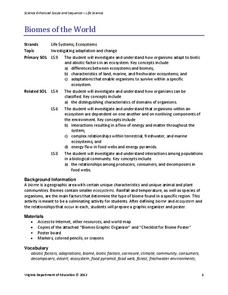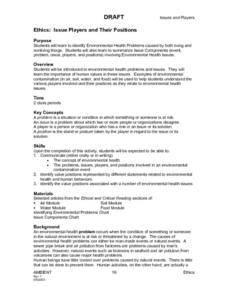Curated OER
Secrets to Healthy Soil
Fourth graders explore needed mineral nutrients for healthy soil. In this soil lesson, 4th graders investigate how living and nonliving elements combine to contribute to fertile soil development.
Curated OER
Looking at the Community Tree
Third graders review the characteristics of living and nonliving organisms. As a class, they observe a tree and describe the interactions between the living and nonliving organisms surrounding it. To end the instructional activity,...
Curated OER
Hey Diddle Diddle
Students discuss their needs to grow and be healthy. They listen as the teacher explains the definition of "organisms" and "nonliving" Students identify organisms in the classroom. They listen to and view a poster illustrating the "Hey...
Curated OER
Food Chain/Food Web
Students explore ecosystems. In this ecology lesson, students read an article explaining ecosystems. Students create a visual organizer with index cards using components of various ecosystems.
Curated OER
Soil Composition
Students examine soil. In this soil composition lesson students participate in soil sedimentation and filtration activities. The students discuss what non-living and living things are in soil and why it is so important.
Lerner Publishing
Teaching Habitats
What makes up a habitat? Use this resource to engage first graders in the exploration of desert, wetland, forest, and ocean habitats. Youngsters classify plants and animals into the four distinct habitats through drawings and cutting and...
Curated OER
Characteristics of Living Things
Seventh graders identify the characteristics of living and non-living things. In this biology lesson, 7th graders define vocabulary words as they go through the lesson. They answer a crossword puzzle after class discussion.
Virginia Department of Education
Biomes of the World
Incorporate knowledge about biomes and ecosystems in multiple ways while encouraging creativity. Emerging ecologists collaborate and perform research to complete a graphic organizer about various biomes of the world. They conclude the...
Curated OER
Color in the Garden
Third graders study color in a garden environment. In this color lesson, 3rd graders explore the colors of living and nonliving elements within a garden environment. Resources are provided.
Curated OER
Cricket Wars
Third graders explore living and nonliving things in a garden environment. In this garden environment instructional activity, 3rd graders study the effects of crickets in a garden. Students explore the interaction between living and...
Curated OER
Exploring the Great Salt Lake
Third graders participate in a scavenger hunt, looking for things that are unique about the ecosystem in and around the lake. They observe and describe a variety of habitats and distinguish living and nonliving elements of...
Curated OER
Making a Mini Worm Habitat
Students explore the process of converting organic waste into usable fertilizer. They observe how living and nonliving things interact with one another by making a mini-worm habitat.
Curated OER
Bacteria: The good, the bad, the ugly
Seventh graders conduct an experiment. In this bacteria lesson plan, 7th graders list living and nonliving things and brainstorm the characteristics they share. Students are divided into two groups where they put samples of hand soap...
Curated OER
Issue Players and Their Positions
Students identify Environmental Health Problems caused by both living and nonliving things. They summarize Issue Components (event, problem, issue, players, and positions) involving environmental health issues such as contamination in...
Curated OER
Wacky Wildlife World
Fourth graders research organisms in the environment in Kentucky and create brochures for the local area wildlife reserves. Individuals create brochures that include information on habitat, body characteristics, scientific class, role...
Curated OER
Environmental Conditions: Friend or Foe
Students research and answer questions on how organisms are classified and how their needs are met through their environment. They work in small groups and create a poster, chart, rap, PowerPoint, or brochure demonstrating how organisms...
Curated OER
Ecosystems: What Are They and How Do They Work?
Students explore the characteristics of major ecosystems, the interactions of the organisms within the systems, and the effects of humans on the system. Both living and non-living components are examined in this five lesson unit.
Curated OER
What Makes Up Rocks and Soils?
For this rocks and soils worksheet, students will complete a Venn diagram comparing the specific characteristics of rocks and soils.
Curated OER
Discovering Local Food Chains
Fourth graders study about food chains. With the assistance of a local biologist, Students hike the school trail system. They explore ecosystem and collect data by charting the organisms found and identifying the energy source. They...
Curated OER
Organisms and Their Environment
In this organisms and their environment worksheet, students will review concepts relating to ecological studies, levels of organization in ecology, and relationships between organisms in ecosystems. This worksheet has 10 fill in the...
Curated OER
Cows, Worms, and Compost
Students study decomposition. In this decomposition lesson, students discuss the background information about decomposition. Students then complete the 'Chew It Twice' worksheet.
Curated OER
Ecology
In this ecology worksheet students complete a crossword puzzle that incorporates all of the ecological vocabulary in the word puzzle.
Curated OER
Biotic and Abiotic Factors
In this biotic and abiotic factors learning exercise, students complete 20 various types of questions related to biotic and abiotic factors. First, they write the vocabulary word that best completes the sentence. Then, students state an...
Curated OER
The Seven Characteristics of Life
Third graders investigate the characteristics of living and nonliving things. They conduct a research quest in order to identify the seven characteristics of life. Then students pick one aspect and use it to create a song meant to be...

























